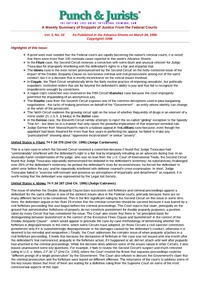Punch and Jurists: March 4, 1996

Volume 3, Number 10
In this issue:
- U.S. v. Moya, No. 94-4912 (11th Cir.) (74 F.3d 1117) (February 12, 1996) (Judge James Larry Edmondson)
(p None) - U.S. v. Filani, No. 95-1051, No. 73 (2nd Cir.) (74 F.3d 378) (January 11, 1996) (Judge Richard J. Cardamone)
(p None) - U.S. v. Bhagavan, No. 3:954-CR-23 (N.D.Ind.) (911 F.Supp. 351) (August 22, 1995) (Judge Robert L. Jr. Miller)
(p None) - U.S. v. Sanchez, No. 94-60686 (5th Cir.) (74 F.3d 562) (January 23, 1996) (Judge Edith H. Jones)
(p None) - U.S. v. Restrepo-Aguilar, No. 95-1660 (1st Cir.) (74 F.3d 361) (January 30, 1996) (Judge Sandra L. Lynch)
(p None) - U.S. v. Jones, No. 94-CR-143 (N.D.N.Y.) (911 F.Supp. 54) (January 2, 1996) (Judge Howard G. Munson)
(p None) - U.S. v. Brannan, No. 95-3108 (3rd Cir.) (74 F.3d 448) (January 12, 1996) (Judge Marjorie O. Rendell)
(p None) - U.S. v. Butler, No. 94-30369 (9th Cir.) (74 F.3d 916) (January 22, 1996) (Judge Arthur L. Alarcon)
(p None) - U.S. v. Windle, No. 95-8008 (10th Cir.) (74 F.3d 997) (January 22, 1996) (Judge Wade Brorby)
(p None) - U.S. v. Copple, No. 95-3119 (3rd Cir.) (74 F.3d 479) (February 1, 1996) (Judge Dolores K. Sloviter)
(p None) - U.S. v. Restrepo-Aguilar, No. 95-1660 (1st Cir.) (74 F.3d 361) (January 30, 1996) (Judge Sandra L. Lynch)
(p None) - U.S. v. Moya, No. 94-4912 (11th Cir.) (74 F.3d 1117) (February 12, 1996) (Judge James Larry Edmondson)
(p None) - U.S. v. Filani, No. 95-1051, No. 73 (2nd Cir.) (74 F.3d 378) (January 11, 1996) (Judge Richard J. Cardamone)
(p None) - U.S. v. Jones, No. 94-CR-143 (N.D.N.Y.) (911 F.Supp. 54) (January 2, 1996) (Judge Howard G. Munson)
(p None) - U.S. v. Brannan, No. 95-3108 (3rd Cir.) (74 F.3d 448) (January 12, 1996) (Judge Marjorie O. Rendell)
(p None) - U.S. v. Copple, No. 95-3119 (3rd Cir.) (74 F.3d 479) (February 1, 1996) (Judge Dolores K. Sloviter)
(p None) - U.S. v. Adams, No. 93-3058 (11th Cir.) (74 F.3d 1093) (February 12, 1996) (Judge Richard Mills)
(p None) - U.S. v. Lin Lyn Trading, Ltd., No. 94-CR-168G (D.Utah) (911 F.Supp. 494) (January 11, 1996) (Judge J. Thomas Greene)
(p None) - U.S. v. Medina, No. 95-1131, No. 173 (2nd Cir.) (74 F.3d 413) (January 23, 1996) (Per Curiam)
(p None)